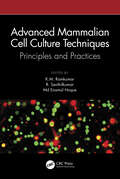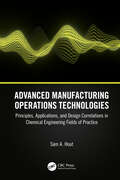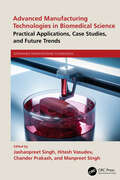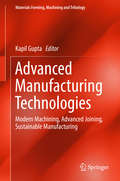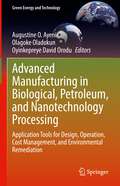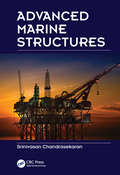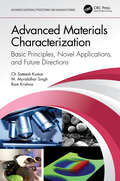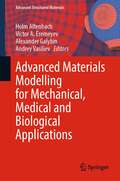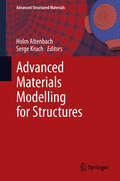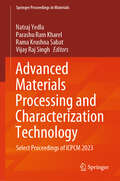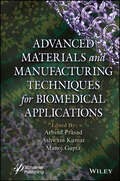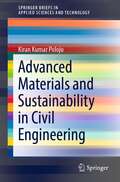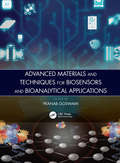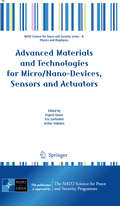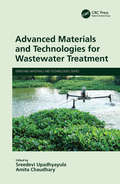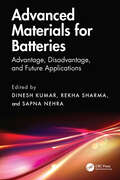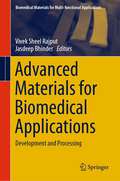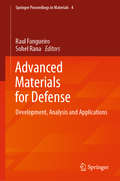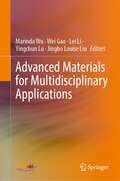- Table View
- List View
Advanced Mammalian Cell Culture Techniques: Principles and Practices
by Md Enamul Hoque R. Senthilkumar K. M. RamkumarThis up-to-date book compiles both basic and advanced laboratory techniques of mammalian cell culture. It is divided into four major sections encompassing the basics of cell culture, nucleic acid and protein isolation, cell-staining techniques, and cell transfection and single-cell analysis. The topics include aseptic handling, media preparation, and passaging of cells. The book also outlines downstream assays such as nucleic acid and protein isolation from in-vitro cell cultures. Key Features: • Covers cellular staining using fluorescent dyes, genetic manipulation of cells via transfection, and an introduction to single-cell analyses • Discusses basics in cell culture and downstream applications including gene and protein expression analysis • Includes the principles underlying each of the techniques and provides a detailed methodology to practice • Explores the whole range of techniques – from basic to downstream applications and advanced methods The book is essential for students and researchers in the field of life sciences, biotechnology, genetics, and molecular biology.
Advanced Manufacturing Operations Technologies: Principles, Applications, and Design Correlations in Chemical Engineering Fields of Practice
by Sam A. HoutThis book discusses and chronicles various types of manufacturing processes, including casting and molding, machining, joining, shearing, and forming. It refers to repetitive, discrete job shop process manufacturing (continuous) and process manufacturing (batch). It also offers detailed examples from the nuclear, electronic, plastics, adhesives, inks, packaging, chemical, and pharmaceutical industries. Advanced Manufacturing Operations Technologies: Principles, Applications, and Design Correlations in Chemical Engineering Fields of Practice fills the gap in the connection between production and regulated applications in several industries. It highlights established concepts and provides a new, fresh outlook by concentrating on and creating linkages in the implementation of practices in manufacturing and safe, clean energy systems. Case studies for the overall design, installations, and construction of manufacturing operations in various industries as well as the standard operating procedures are offered. The book also discusses the correlation between design strategies including step-by-step processes to ensure the reliability, safety, and efficacy of products. The fundamentals of controlled techniques, quality by design, risk assessment, and management are covered in support of operations applications and continuous improvement. This comprehensive book is helpful to all professionals, students, and academicians in many scientific disciplines that utilize fundamental principles of chemical engineering. It is engineering-driven and will be of use to those in industrial and manufacturing, chemical, biochemical, mechanical engineering, and automated control systems fields.
Advanced Manufacturing Technologies in Biomedical Science: Practical Applications, Case Studies, and Future Trends (Sustainable Manufacturing Technologies)
by Manpreet Singh Chander Prakash Hitesh Vasudev Jashanpreet SinghAs healthcare challenges such as human aging and traffic accidents continue to increase exponentially, the biomedical sector faces a significant obstacle in arranging patient-specific biomedical products. Over the past two decades, additive manufacturing’s printing quality and ease of production have gained global attention, particularly in the development of scaffolds and implants.This book explores additive manufacturing technologies and their categorization, materials, processing factors, output responses, advantages, challenges, and biomedical applications. It provides a critical analysis of past biomedical applications of additive manufacturing technology, explores recent advancements, and examines the design, applications, and characterizations of biomedical components using additive manufacturing techniques. Moreover, it discusses notable applications of additive fabrication in aerospace, education, and medicine, as it showcases the medical applications of rapid prototyping, addressing computational and experimental aspects of 3D-printed biomedical devices. Also, it provides future human implications and developments.Advanced Manufacturing Technologies in Biomedical Science: Practical Applications, Case Studies, and Future Trends offers a unique framework for understanding and evaluating the latest advancements in biomedical additive manufacturing. This book targets individuals interested in conducting research, providing valuable insights, and can serve as an authoritative source of information for manufacturers and academic researchers in the business sector.
Advanced Manufacturing Technologies: Modern Machining, Advanced Joining, Sustainable Manufacturing (Materials Forming, Machining and Tribology)
by Kapil GuptaThis book provides details and collective information on working principle, process mechanism, salient features, and unique applications of various advanced manufacturing techniques and processes belong. The book is divided in three sessions covering modern machining methods, advanced repair and joining techniques and, finally, sustainable manufacturing. The latest trends and research aspects of those fields are highlighted.
Advanced Manufacturing and Materials Science: Selected Extended Papers Of ICAMMS 2018 (Lecture Notes On Multidisciplinary Industrial Engineering)
by J. Paulo Davim Kurian AntonyPresents papers on additive manufacturing.<P><P> Peer reviewed chapters on recent advances in the manufacturing sector.<P> Discusses optimization processes in manufacturing.<P>This book presents selected papers from the international conference on advanced manufacturing and materials sciences (ICAMMS 2018). The papers reflet recent advances in manufacturing sector focusing on process optimization and give emphasis to testing and evaluation of new materials with potential use in industrial applications.
Advanced Manufacturing in Biological, Petroleum, and Nanotechnology Processing: Application Tools for Design, Operation, Cost Management, and Environmental Remediation (Green Energy and Technology)
by Augustine O. Ayeni Olagoke Oladokun Oyinkepreye David OroduThis book covers advanced manufacturing in biological, petroleum, and nanotechnology processing for the development of novel products and systems that incorporate enhanced pollution control and waste management for environmental remediation. The book is divided into three parts. The first section looks at the design and application of process systems, the second section focuses largely on pollution control and management, and the final section discusses areas related to process modeling and simulation. Coverage highlights the integration of smart tools and solutions and looks at current advances in monitoring industrial and environmental processes that can assist in making significant progress in process design for the effective control of pollution and waste management.
Advanced Marine Structures
by Srinivasan ChandrasekaranDue in part to a growing demand for offshore oil and gas exploration, the development of marine structures that initially started onshore is now moving into deeper offshore areas. Designers are discovering a need to revisit basic concepts as they anticipate the response behavior of marine structures to increased water depths. Providing a sim
Advanced Materials Characterization: Basic Principles, Novel Applications, and Future Directions (Advanced Materials Processing and Manufacturing)
by Ch Sateesh Kumar M. Muralidhar Singh Ram KrishnaThe book covers various methods of characterization of advanced materials commonly used in engineering including understanding of the working principle and applicability of devices. It explores the techniques implemented for advanced materials like superalloys, thin films, powders, nanocomposites, polymers, shape memory alloys, high entropy alloys, and so on. Major instruments covered include X-ray diffraction, near-field scanning optical microscopy Raman, X-ray photospectroscopy, ultraviolet-visible-near-infrared spectrosphotometer, Fourier-transform infrared spectroscopy, differential scanning calorimeter, profilometer, and thermogravimetric analysis. Features: Covers material characterization techniques and the development of advanced characterization technology Includes multiple length scale characterization approaches for a large variety of materials, from nano- to micron-scale, as well as their constraints Discusses advanced material characterization technology in the microstructural and property characterization fields Reviews both practical and theoretical explanations of approaches for characterizing microstructure and properties Offers fundamentals, basic instrumentation details, experimental approaches, analyses, and applications with case studies This book is aimed at graduate students and researchers in materials science and engineering.
Advanced Materials Modelling for Mechanical, Medical and Biological Applications (Advanced Structured Materials #155)
by Holm Altenbach Victor A. Eremeyev Alexander Galybin Andrey VasilievThe book is devoted to the 70th birthday of Prof. Sergey M. Aizikovich, which will celebrated on August 2nd 2021. His scientific interests are related to the following topics: Mechanics of contact interactions, Functionally graded materials, Mechanics of fracture, Integral equations of mathematical physics, Inverse problems of the theory of elasticity, and Applications of elasticity to biological and medical problems of mechanics of materials. The papers, collected in the book, are contributions of authors from 10 countries.
Advanced Materials Modelling for Structures: With Multi-scale Effects Or Under Multi-field Actions (Advanced Structured Materials #19)
by Holm Altenbach Serge KruchThis volume presents the major outcome of the IUTAM symposium on "Advanced Materials Modeling for Structures". It discusses advances in high temperature materials research, and also to provides a discussion the new horizon of this fundamental field of applied mechanics. The topics cover a large domain of research but place a particular emphasis on multiscale approaches at several length scales applied to non linear and heterogeneous materials. Discussions of new approaches are emphasised from various related disciplines, including metal physics, micromechanics, mathematical and computational mechanics.
Advanced Materials Processing and Characterization Technology: Select Proceedings of ICPCM 2023 (Springer Proceedings in Materials #2)
by Natraj Yedla Parashu Ram Kharel Rama Krushna Sabat Vijay Raj SinghThe book comprises select proceedings of the International Conference on Processing and Characterization of Materials (ICPCM-2023). It provides an understanding of advancement in material's processing and characterization. Students at the early stage of research will be highly benefitted from the book which provides guidance to the technological advancement in the field of Metallurgy and Materials Engineering. Comprehension of the concept of material design, tailoring the process parameters is of utmost importance to achieve the required properties in application. The book involves several wide aspects of study such as experimental, Modelling and Simulation based materials characterization, extraction based on ferrous and non-ferrous metals, Corrosion and atmospheric degradation of materials, Texture of materials. The book will be helpful for the undergraduate, post graduate and doctoral students in their respective research areas.
Advanced Materials and Components for 5G and Beyond (Springer Series in Materials Science #327)
by Colin TongThis book provides a comprehensive introduction to the current status and future trends of materials and component design for fifth-generation (5G) wireless communications and beyond. Necessitated by rapidly increasing numbers of mobile devices and data volumes, and acting as a driving force for innovation in information technology, 5G networks are broadly characterized by ubiquitous connectivity, extremely low latency, and very high-speed data transfer. Such capabilities are facilitated by nanoscale and massive multi-input multi-output (MIMO) with extreme base station and device densities, as well as unprecedented numbers of antennas. This book covers semiconductor solutions for 5G electronics, design and performance enhancement for 5G antennas, high frequency PCB materials and design requirements, materials for high frequency filters, EMI shielding materials and absorbers for 5G systems, thermal management materials and components, and protective packaging and sealing materials for 5G devices. It explores fundamental physics, design, and engineering aspects, as well as the full array of state-of-the-art applications of 5G-and-beyond wireless communications. Future challenges and potential trends of 5G-and-beyond applications and related materials technologies are also addressed. Throughout this book, illustrations clarify core concepts, techniques, and processes. At the end of each chapter, references serve as a gateway to the primary literature in the field. This book is essential reading for today’s students, scientists, engineers and professionals who want to understand the current status and future trends in materials advancement and component design in 5G and beyond, and acquire skills for selecting and using materials and 5G component design that takes economic and regulatory aspects into account.
Advanced Materials and Manufacturing Techniques for Biomedical Applications (Advances In Manufacturing, Design And Computational Intelligence Techniques Ser.)
by Manoj Gupta Ashwani Kumar Arbind PrasadADVANCED MATERIALS and MANUFACTURING TECHNIQUES for BIOMEDICAL APPLICATIONS The book provides essential knowledge for the synthesis of biomedical products, development, nanomaterial properties, fabrication processes, and design techniques for different applications, as well as process design and optimization. In origin, biomaterials can come from nature or be synthesized in the laboratory with a variety of approaches that use metals, polymers, ceramic, or composite materials. They are often used or adapted for various biomedical applications. Biomaterials are commonly used in scaffolds, orthopedic, wound healing, fracture fixation, surgical sutures, artificial organ developments, pins and screws to stabilize fractures, surgical mesh, breast implants, artificial ligaments and tendons, and drug delivery systems. The sixteen chapters in Advanced Materials and Manufacturing Techniques in Biomedical Applications cover the synthesis, processing, design, manufacturing, and characterization of advanced materials; self-healing, bioinspired, nature-resourced, nanobiomaterials for biomedical applications; and manufacturing techniques such as rapid prototyping, additive manufacturing, etc. Audience The book is for engineers, technologists, and researchers working in the area of biomedical engineering and manufacturing techniques. It is also appropriate for upper-level undergraduate and graduate students.
Advanced Materials and Sustainability in Civil Engineering (SpringerBriefs in Applied Sciences and Technology)
by Kiran Kumar PolojuThis book discusses the detailed concepts of concrete and its development with pros and cons. Besides, the significance of various industrial wastes as partial replacements with concrete ingredients such as cement and aggregates are discussed. The creation of cement contributes to around 7% of carbon emissions into the atmosphere leading to greenhouse effect and global warming. Similarly, the wastes generated from various industries such as thermal, steel, ceramic, marble, paper and etc. shows the impact on atmosphere and leads to air pollution and land pollution. Thus, it is essential to focus on these wastes to use them in a profitable manner without compromising the current needs. This book discusses a few examples on studies of using various industry wastes as partial replacement of cement in concrete
Advanced Materials and Techniques for Biosensors and Bioanalytical Applications
by Pranab GoswamiBioanalytical science and its technological subdomain, biosensors, are ever-evolving subjects, striving for rapid improvement in terms of performance and expanding the target range to meet the vast societal and market demands. The key performance factors for a biosensor that drive the research are selectivity, sensitivity, response time, accuracy, and reproducibility, with additional requirements of its portability and inexpensive nature. These performance factors are largely governed by the materials and techniques being used in these bioanalytical platforms. The selection of materials to meet these requirements is critical, as their interaction or involvement with the biological recognition elements should initiate or improve these performance factors. The technique discussed primarily applies to transducers involved in converting a biochemical signal to optical or electrical signals. Over the years, the emergence of novel materials and techniques has drastically improved the performance of these bioanalytical systems, enabling them to expand their analytical horizon. These advanced materials and techniques are central to modern bioanalytical and biosensor research. Advanced Materials and Techniques for Biosensors and Bioanalytical Applications provides a comprehensive review of the subject, including a knowledge platform for both academics and researchers. Considering biosensors as a central theme to this book, an outline on this subject with background principles has been included, with a scope of extending the utility of the book to coursework in graduate and postgraduate schools. Features: • Basic principles on different classes of biosensors, recent advances and applications • Smart materials for biosensors and other rapid, portable detection devices • Metal nanoparticles and nanocrystals for analytical applications • Carbon-based nanoparticles and quantum dots for sensing applications • Nanozymes as potential catalysts for sensing applications • Bioelectrochemiluminescence and photoelectrochemical-based biosensors • Paper electronics and paper-based biosensors • Microbial biosensors: artificial intelligence, genetic engineering, and synthetic biology • Biofuel cells as a signal transduction platform • FET-based biosensors, including ISFET and BioFET This book serves as a reference for scientific investigators and a textbook for a graduate-level course in biosensors and advanced bioanalytical techniques.
Advanced Materials and Technologies for Micro/Nano-Devices, Sensors and Actuators (NATO Science for Peace and Security Series B: Physics and Biophysics)
by Arthur Dideikin Eric Garfunkel Evgeni GusevThe main goal of this book is to review recent progress and current status of MEMS/NEMS technologies and devices. Several important areas are discussed: history of research in the field, device physics, examples of sucessful applications, sensors, materials and processing aspects. The authors who have contributed to the book represent a diverse group of leading scientists from academic, industrial and governmental labs worldwide who bring a broad array of backgrounds such as device physics, technologists, electrical and mechanical engineering, surface chemistry and materials science). The contributions to this book are accessible to both expert scientists and engineers who need to keep up with leading edge research, and newcomers to the field who wish to learn more about the exciting basic and applied research issues relevant to micromechanical devices and technologies.
Advanced Materials and Technologies for Wastewater Treatment (Emerging Materials and Technologies)
by Sreedevi Upadhyayula Amita ChaudharyAdvanced Materials and Technologies for Wastewater Treatment discusses the methods and technologies of physical, chemical, biological, and thermo-catalytic treatment techniques. It includes the treatment of waste generated by municipal, agro-industry, and other industries including chemical, biomedical, pharmaceutical, textile, and other sectors. FEATURES Covers implementation of advanced water and wastewater treatment techniques, with a focus on pollutant or pathogen removal Includes qualitative and quantitative analyses Focuses on physical, chemical, and biological treatment technologies Discusses the advancements of materials and technologies applicable to both potable water and wastewater from industrial and municipal sources Explores future challenges and viable solutions This book is aimed at chemical and environmental engineers and researchers seeking a thorough treatment of innovative water treatment materials and techniques for practical applications.
Advanced Materials for Batteries: Advantage, Disadvantage, and Future Applications
by Dinesh Kumar Rekha Sharma Sapna NehraThe rise of renewable energy responds to global warming, necessitating reliable storage like batteries. Though frequent use can affect their lifespan, these have become smaller, simpler, and more adaptable. Recent technological progress has improved batteries' longevity and efficiency, with costs dropping due to mass production. This book examines different battery types, their evolution, and the cutting-edge materials enhancing their performance, particularly focusing on metal oxides in various battery technologies.Exploring advanced materials for batteries is not just a theoretical exercise but a practical journey into the future of energy. This book is an essential guide, tracing the evolution from early battery technology to the latest innovations and equipping researchers, engineers, and students with the practical knowledge to drive the next wave of sustainable energy solutions.Key Features:· Provides a comprehensive resource for academics, researchers, and engineers in energy storage, with detailed insights into various battery types.· Discusses advanced materials for smart and small batteries.· Delves into cutting-edge materials designed for compact and efficient batteries.· Offers a visionary outlook on the evolution of battery technology and traces historical advances alongside the latest breakthroughs in battery science and future perspectives.This book serves as a beacon, bridging historical milestones with future goals. It thoroughly explores materials, including lithium-ion and sodium-ion, in a manner accessible to everyone. It lays a robust groundwork for innovators in energy storage, steering us towards a more sustainable tomorrow. This work informs and connects readers to the evolving narrative of battery technology.
Advanced Materials for Biomedical Applications (Advances in Manufacturing, Design and Computational Intelligence Techniques)
by Ashwani Kumar Avinash Kumar Yatika Gori Chandan Swaroop MeenaThe text discusses synthesis, processing, design, simulation and characterization of biomaterials for biomedical applications. It synergizes exploration related to various properties and functionalities in the biomedical field through extensive theoretical and experimental modeling. It further presents advanced integrated design and nonlinear simulation problems occurring in the biomedical engineering field. It will serve as an ideal reference text for senior undergraduate and graduate students, and academic researchers in fields including biomedical engineering, mechanical engineering, materials science, ergonomics, and human factors. The book Employs a problem-solution approach, where, in each chapter, a specific biomedical engineering problem is raised and its numerical, and experimental solutions are presented. Covers recent developments in biomaterials such as OPMF/KGG bio composites, PEEK-based biomaterials, PF/KGG biocomposites, oil palm mesocarp Fibre/KGG biocomposites, and polymeric resorbable materials for orthopedic, dentistry and shoulder arthroplasty applications. Discusses mechanical performance and corrosive analysis of biomaterials for biomedical applications in detail. Presents advanced integrated design and nonlinear simulation problems occurring in the biomedical engineering field. Presents biodegradable polymers for various biomedical applications over the last decade owing to their non-corrosion in the body, biocompatibility and superior strength in growing state. Synergizes exploration related to the various properties and functionalities in the biomedical field through extensive theoretical and experimental modeling.
Advanced Materials for Biomedical Applications: Development and Processing (Biomedical Materials for Multi-functional Applications)
by Vivek Sheel Rajput Jasdeep BhinderThis book provides an insight into the basic fundamentals of the biomaterials used for the biomedical applications, their development and processing techniques. Advanced materials are significantly utilized for the biomedical applications ranging from dental devices to cancer treatment owing to their higher biocompatibility and better interaction with tissues. This book covers the various topics that include basic biocompatibility phenomena, insight to materials science, class of different advanced materials as a biomaterials, development and processing techniques, design and analysis of the developed advanced materials, investigation of its properties and major applications. Recent information regarding the development techniques and methods for improving the properties of the advanced materials in the field of biomedical applications is highlighted in detail. The textbook offers clear explanation of the text in the chapters with self-explanatory figures and tables. It demonstrates the novel methods, opportunities and ideas for developing biomaterials in the field of biomedical applications. It also includes critical review study of the developed advanced materials for biomedical applications in a new summarized form. The inclusion of the discussions on hybrid polymer-based composites and self-healing composite materials offers a special feature in the textbook. It features a thorough overview of the simulation aspect in the biomedical applications. The book features at least 50% of its references from last three–four years’ work in the field of biomaterials and biomedical. The book content adds to the redundancy in the literature work related to biomedical and biomaterials.This book is a valuable resource for academicians, students and scholars from science and engineering background having interest in biomaterials. It is helpful to the biomedical engineering group especially in countries or location where they don’t have access to the major journals.
Advanced Materials for Clean Energy
by Qiang Xu Tetsuhiko KobayashiResearch for clean energy is booming, driven by the rapid depletion of fossil fuels and growing environmental concerns as well as the increasing growth of mobile electronic devices. Consequently, various research fields have focused on the development of high-performance materials for alternative energy technologies.Advanced Materials for Clean Ene
Advanced Materials for Defense: Development, Analysis and Applications (Springer Proceedings in Materials #4)
by Sohel Rana Raul FangueiroThis book is a collection of high quality research and review papers submitted to the 1st World Conference on Advanced Materials for Defense (AUXDEFENSE 2018). A wide range of topics related to the defense area such as ballistic protection, impact and energy absorption, composite materials, smart materials and structures, nanomaterials and nano structures, CBRN protection, thermoregulation, camouflage, auxetic materials, and monitoring systems is covered. Written by the leading experts in these subjects, this work discusses both technological advances in terms of materials as well as product designing, analysis as well as case studies. This volume will prove to be a valuable resource for researchers and scientists from different engineering disciplines such as materials science, chemical engineering, biological sciences, textile engineering, mechanical engineering, environmental science, and nanotechnology.
Advanced Materials for Future Terahertz Devices, Circuits and Systems (Lecture Notes in Electrical Engineering #727)
by Aritra Acharyya Palash DasThis book highlights the properties of advanced materials suitable for realizing THz devices, circuits and systems, and processing and fabrication technologies associated with those. It also discusses some measurement techniques exclusively effective for THz regime, newly explored materials and recently developed solid-state devices for efficient generation and detection of THz waves, potentiality of metamaterials for implementing THz passive circuits and bio-sensors, and finally the future of silicon as the base material of THz devices. The book especially focuses on the recent advancements and several research issues related to THz materials and devices; it also discusses theoretical, experimental, established, and validated empirical works on these topics.
Advanced Materials for Membrane Fabrication and Modification
by Stephen Gray Toshinori Tsuru Yoram Cohen Woei-Jye LauMembranes are an energy efficient separation technology that are now the basis for many water treatment and food processing applications. However, there is the potential to improve the operating performance of these separations and to extend the application of membranes to energy production, gas separations, organic solvent-based separations, and biomedical applications through novel membrane materials. This book contains 20 chapters written by leading academic researchers on membrane fabrication and modification techniques and provides a comprehensive overview on the recent developments of membrane technology. Membranes can be manufactured from a range of materials including polymeric compounds, and ceramic materials, and both these materials are considered in the book. There are 5 chapters on water and wastewater membranes that cover the fabrication of thin film (TFC) composite membranes for nanofiltration(NF)/reverse osmosis (RO)/forward osmosis (FO) applications, stimuli responsive membranes, electrospun membranes, porous ceramic membranes, and polymeric ultrafiltration (UF) manufacture and modification. There are another 6 chapters on gas separation that consider carbon membranes, zeolite membranes, silica template and metal oxide silica membranes, TFC membranes, silica membranes, and metal organic framework (MOF) membranes. Zeolite membranes are also considered for organic solvent applications, as are solvent-resistant membranes manufactured by phase inversion, ceramic-supported composite membranes, and ceramic NF membranes. The emerging areas of membranes for energy and biomedical applications have 3 and 2 chapters, respectively. Energy applications consider ion exchange membranes for use in fuel cells, membranes for electrodialysis, and membranes for use in microbial fuel cells. For biomedical applications the chapters focus on hemodialysis membranes and redox responsive membranes.
Advanced Materials for Multidisciplinary Applications
by Wei Gao Jingbo Louise Liu Lei Li Marinda Wu Yingchun LuThis book provides an overview of recent research in the area of advanced materials for improving human healthcare, protecting the environment and alternative energy resources. The authors analyze and deliver viable technical solutions, demonstrating how chemistry and engineering can collectively solve technical and societal challenges. The book explores innovative technology for the synthesis of complex carbohydrates & glycoproteins, new drug development & delivery, theragnostics of infectious disease and cancer. It also provides insights into the nature of energy extraction, management and usage related to fossil fuels and sustainable energy. The book brings together a group of dynamic and productive scientists, engineers, and other professionals in celebration of the 40th Anniversary of Chinese American Chemical Society. It is a valuable resource for all readers interested in the study of materials to address society's increasing need for electrical and chemical energy.
